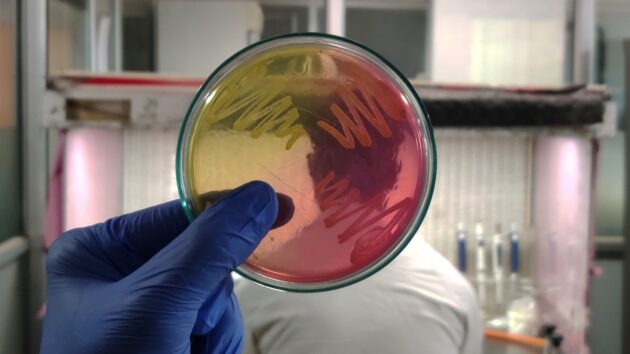
Ayona Silva-Fletcher
Veterinarian
Royal Veterinary College
Scores of scientists have been trained to fill skills gaps in laboratories across the world. They are now playing a valuable role in international and national efforts to monitor and control the threat of antimicrobial resistance.
Antimicrobial resistance (AMR) is a growing global crisis. It could see essential medicines taken for granted for decades becoming increasingly ineffective, resulting in prolonged illness, greater disability and many more deaths from preventable disease.
It has been described as ‘the silent pandemic’ and the World Health Organization has declared it a top 10 public health threat.
AMR is of particular concern in low- and middle-income countries (LMICs), such as those where the One Health Poultry Hub works. Here, antibiotics are widely available without a prescription and often used inappropriately and excessively in human health and livestock production, including in poultry farming.
In Bangladesh, one study showed 137 out of 140 poultry farmers surveyed used antibiotics in their flocks, with very high levels of resistance against common infections for most antibiotics found in chickens, including for vital antibiotics used in human healthcare.
Surveillance – tracking resistant microbes, their genes and mutations – is a key tool to combat the spread of AMR. However, to undertake AMR surveillance effectively, accurate and rapid diagnostic methods to confirm both antibiotic sensitivity (phenotypic testing) and the sequence of resistance genes (genotypic testing) are needed. Although many microbiology labs in LMICs can do phenotypic testing, using antibiotic sensitivity tests, a lack of knowledge, skills and resources means that most are unable to develop molecular diagnostic capabilities to explore AMR gene mutation and transfer.
Inroads have been made into plugging this skills gap with a free online training course developed by the One Health Poultry Hub. The ‘Training programme to build a network of researchers with expertise in molecular diagnostics to monitor and investigate antimicrobial resistance (AMR)’ offers advanced training in phenotypic testing and AMR molecular diagnostics. It is run jointly by Poultry Hub partners Anand Agricultural University and Gujarat Biotechnology Research Centre, both in India, and the Royal Veterinary College, UK.
The course, aimed at bioscientists, and in particular postgraduates and early-career researchers, is run online for six weeks and delivered through online materials, including tutor-led interactive discussions, audio-based forums, video materials and self-assessment quizzes.
Course graduate
In its first year, 52 participants completed the course. Course feedback showed:
Participants came from Africa, Asia, Europe and even the South Pacific; 55% were women. One course graduate said: “I am confident this course will change my attitude [so I can] practice in the laboratory confidently.”
Another said: “I hope to develop a research project on the detection of AMR in my country, to make available the results found and provide credible data on this global menace.”
The course initially had an in-person practicals component, but COVID-19 limited those who could attend this. The success of the online component means the course can be made widely available, boosting global impact.
The demand exists: more than 14 people applied for each place on the first courses.
As well as developing advanced microbiological skills that they can use in their labs, course graduates make important links with other labs in their region and further afield. Of those completing the evaluation survey, 100% want to maintain contact with their course cohort.
This network building aspect of the course is as important as its capability raising. It is set to facilitate cooperative working between labs across the world, including working together in projects and sharing data – essential collaborations in the global fight against AMR.
This training programme was a collaboration between GCRF One Health Poultry Hub partners Anand Agricultural University, Gujarat Biotechnology Research Centre and Royal Veterinary College, UK, and funded initially by the UK’s Biotechnology and Biological Sciences Research Council under the Global Challenges Research Fund Strategic Training Awards for Research Skills (GCRF-STARS) programme.

Veterinarian
Royal Veterinary College